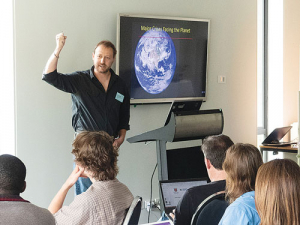NZ kiwifruit sector on alert for mysterious Italian disease
New Zealand's kiwifruit industry is on alert following reports of a mystery disease that is sweeping through Italian orchards.
 American entomologist Dr Jon Lundgren speaks at a workshop on biological pest control, organised by the Bio-Protection Research Centre, Lincoln University.
American entomologist Dr Jon Lundgren speaks at a workshop on biological pest control, organised by the Bio-Protection Research Centre, Lincoln University.
Agrichemicals are an addiction and pests are not the problem, claims a visiting American entomologist, Dr Jon Lundgren.
Lundgren promotes “regenerative agriculture” – a term he says is now replacing “sustainable” agriculture.
The FAO estimates that the world has only 60 years of topsoil left, he said.
“So we can’t just be sustaining a degraded resource. We need to be regenerating that, while producing our food.”
That requires re-growing soil and biodiversity on farms.
“I think farmers are realising more and more that their profits are decreasing. It’s getting harder and harder to farm the way we’ve been.
“We are just degrading that natural resource base and the writing is on the wall about how long we can do that.”
Lundgren was speaking at a four-day workshop on biological pest control run by the Lincoln University Bio-Protection Research Centre.
He told the workshop that pests are a symptom of underlying imbalance, and monoculture agriculture is the central problem.
“The way we approach food production is way, way too simplified.”
Lundgren runs a research centre on a small farm in South Dakota, surrounded by large monoculture cropping farms and continuously grazed beef farms.
“This is kind-of ‘ground zero’ for where change really needs to happen.”
Biodiversity was how habitats used to function and when you eliminate the diversity from a system the only thing left is to dose with agrichemicals, yet the ranchers with the most pests are the ones using the most pesticide use, he said.
One researcher showed that avermectins, commonly used in drenches, passed through the animal and then killed 98% of the insects living in dung, when only 1.7% of those were actually pests.
The first step to regenerative agriculture is to abandon the pesticides, said Lundgren.
“Usually within the first year you see that these natural balances of communities start to re-establish.”
Regenerative ranchers who replace pesticide use with good management find it a good business decision, he said.
The second step, for graziers, is to mimic natural grazing patterns by high-intensity grazing in small areas, frequently moving the stock and leaving the heavily grazed pasture to regrow for as much as a year before it is grazed again.
“We can learn a lot from the way they used to produce food, back before industrialisation.
“Technology has shown us what some of the yield potentials and profit potentials are, but I think we’ve reached a plateau in how far we can push things.”
Humbling, overwhelming, and an absolute honour. That’s how 2024 Fonterra Dairy Woman of the Year Katrina Roberts describes her win at the Dairy Women’s Network conference earlier this month.
Hamilton-based Dairy Goat Co-operative (DGC) is revamping its leadership in the hope of recovering from its financial doldrums.
With just over two weeks left in the 2023-24 season, all eyes will be on Fonterra's opening milk price for the new season.
Fonterra Brands' Cathy Lang has been crowned the country's best cheesemaker for the second time in three years.
James and Debbie Stewart of Dairylands in the Manawatū are no strangers to taking home the silverware.
Troubled milk processor Synlait's share price is taking a hammering as nervous investors offload their stakes.

OPINION: This old mutt well remembers the wailing, whining and gnashing of teeth by former West Coast MP and Labour…
OPINION: Your canine crusader gets a little fed up with the some in media, union hacks, opposition politicians and hard-core…